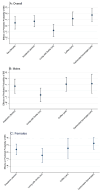Dietary habits as associated factors with irritable bowel syndrome among medical students: evidence from a cross-sectional study
- PMID: 39154172
- PMCID: PMC11330611
- DOI: 10.1186/s12876-024-03320-w
Dietary habits as associated factors with irritable bowel syndrome among medical students: evidence from a cross-sectional study
Abstract
Background: Research on Irritable Bowel Syndrome (IBS) among medical students has increased globally, highlighting a high prevalence in this demographic. However, there is a lack of data specifically regarding the prevalence of IBS among medical students in Yemen. This study aimed to investigate the prevalence and associated factors of IBS among Yemeni medical students.
Methods: We conducted a cross-sectional study involving medical students who completed a validated self-administered questionnaire incorporating socio-demographic information, dietary habits, smoking status, sleep patterns, and the Rome IV criteria for IBS. We used bivariate and multivariate logistic regression models to identify IBS's associated factors, estimated as odds ratios (ORs) with 95% confidence intervals (CIs) and average marginal effect (AME) on the predicted probability of IBS.
Results: The study included 351 medical students with a mean age of 22.53 ± 2.70 years; 39.60% (139) were females. The prevalence of IBS was 26.21% (92 students), with 67.39% (62) of them classified as IBS-M (mixed). In multivariable analysis, the consumption of carbonated soft drinks remained significantly associated with IBS (OR: 3.35; 95% CI: 1.14-9.88; P = 0.028). In males, coffee consumption had a substantial effect on the predicted probability of IBS (AME: 11.41%; 95% CI: 0.32-22.60). In females, the consumption of carbonated soft drinks had a significant effect on the predicted probability of IBS (AME: 24.91%; 95% CI: 8.34-41.48).
Conclusion: The consumption of carbonated soft drinks is significantly associated with IBS among medical students, with a particularly notable increase in the predicted probability of IBS in females. These findings highlight the necessity for gender-specific dietary recommendations in IBS management. Further research is essential to investigate IBS in the general population to gain a comprehensive understanding of its prevalence and associated factors.
Keywords: Dietary habits; Irritable bowel syndrome; Rome IV criteria; Yemeni medical students.
© 2024. The Author(s).
Conflict of interest statement
The authors declare no competing interests.
Figures
References
-
- Sperber AD, Bangdiwala SI, Drossman DA, Ghoshal UC, Simren M, Tack J, et al. Worldwide prevalence and burden of functional gastrointestinal disorders. Results Rome Foundation Global Study. 2021;160(1):99–114. e3. - PubMed
-
- Lacy BE, Mearin F, Chang L, Chey WD, Lembo AJ, Simren M, et al. Bowel Disorders Gastroenterol. 2016;150(6):1393–407. e5. - PubMed
MeSH terms
Substances
Grants and funding
LinkOut - more resources
Full Text Sources


